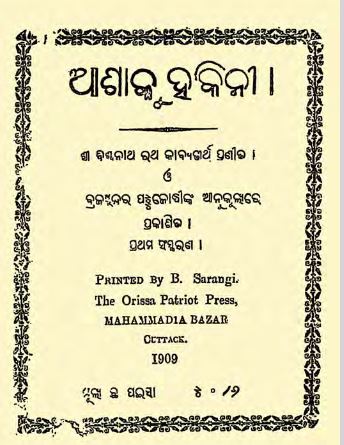Asaku Hakini published in 1909 by the esteemed Odia poet Biswanath Rath, stands as a monumental work in the realm of Odia literature. This collection of poetry delves deep into the complexities of human emotions, social issues, and the nuances of love, all while maintaining a distinctly lyrical quality that captures the essence of the Odia language. Rath, recognized for his innovative style and profound thematic explorations, crafts a rich tapestry of verses that resonate with both cultural pride and universal truths.
The title “Asaku Hakini” translates to “The Voice of Desire,” which aptly encapsulates the core theme of the collection. Throughout the poems, Rath artfully expresses the myriad forms of desire that govern human existence—desire for love, for understanding, for justice, and for connection with the divine. His work reflects a deep introspection into the human psyche, exploring how these desires shape our identities and experiences.
The poems in “Asaku Hakini” prominently feature the theme of longing—be it romantic, spiritual, or existential. Rath’s exploration of longing resonates with readers on multiple levels. The verses may depict a lover’s yearning for their beloved, using evocative imagery and metaphors that draw from nature and everyday life. This intense longing is not merely personal; it mirrors a collective yearning for a more profound connection with the world and the divine.
In addition to personal emotions, Rath addresses social issues that were pertinent to the early 20th century in India. He skillfully weaves critiques of societal norms into his poetry, challenging the status quo and advocating for social justice. Through poignant sub-poems, he highlights the struggles of marginalized communities, expressing solidarity with those who seek recognition and change.
Rath’s connection to nature is deeply embedded in his poetry. He draws parallels between natural phenomena and emotional experiences, illustrating how the beauty and turmoil of nature mirror the human condition. The changing seasons often serve as metaphors for the cycles of love and loss, joy and sorrow. This interplay between nature and spirituality imbues the poems with a transcendent quality, inviting readers to reflect on their place in the universe.
Beyond tangible themes of desire and social critique, Rath engages in philosophical reflections that encourage readers to ponder the meaning of life, existence, and the divine. The verses invoke a sense of contemplative introspection, prompting individuals to explore their inner selves and the quest for meaning in a rapidly changing world.
Asaku Hakini remains a seminal work in Odia literature, resonating beyond its time of publication to inspire contemporary readers. Biswanath Rath’s profound exploration of desire, social justice, and spirituality offers insights that continue to be relevant today. His lyrical prowess and emotional depth not only celebrate the beauty of the Odia language but also engage readers in a discourse that transcends cultural boundaries. “Asaku Hakini” is not just a collection of poems; it is a heartfelt dialogue with the self and the world, inviting readers to embark on their own journeys of reflection and discovery.
Books Info
| Books name | Asaku Hakini |
| Author | Biswanath Rath |
| No Of pages | 41 |
| Publisher | NA |
| Publication | 1909 |
| Printed At | The Orissa Patriot Press |
| Distributor | NA |

